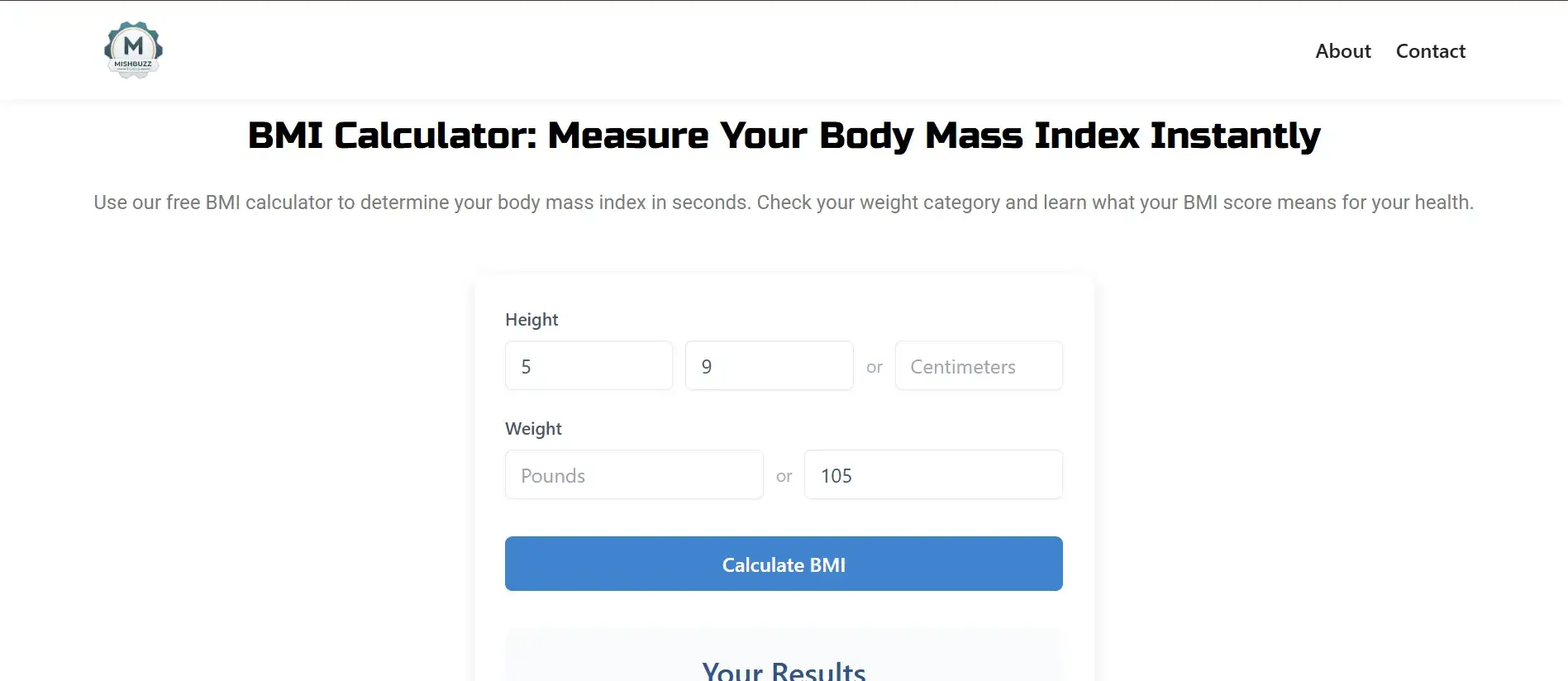BMI Calculator: Measure Your Body Mass Index Instantly
Use our free BMI calculator to determine your body mass index in seconds. Check your weight category and learn what your BMI score means for your health.
Your Results
Understanding BMI
Body Mass Index (BMI) is a screening tool that estimates body fat based on height and weight. While not diagnostic, it helps identify potential weight categories that may lead to health problems.
For more accurate health assessment, consult a healthcare provider.
BMI Calculator: Understand Your Body Mass Index & Health Risks

A BMI calculator is an essential health assessment tool that evaluates whether your weight falls within a healthy range based on your height. Used by healthcare professionals worldwide, Body Mass Index (BMI) provides valuable insights into potential health risks associated with body weight.
Why BMI Matters for Your Health
The body index calculator serves as a crucial screening tool endorsed by major health organizations including the World Health Organization and CDC.
Health Risk Assessment
Higher BMI values correlate with increased risk for serious conditions:
- Type 2 diabetes (7x higher risk)
- Heart disease (2x higher risk)
- Certain cancers (12 types linked)
- Sleep apnea and respiratory issues
Weight Management Tracking
Tracking changes in your mass index calculator results helps:
- Monitor progress during weight programs
- Identify unhealthy weight trends early
- Set realistic health goals
- Evaluate effectiveness of interventions
BMI Categories & Health Implications
| BMI Range | Category | Health Risk Level | Recommended Action |
|---|---|---|---|
| < 18.5 | Underweight | High (nutritional deficiencies) | Nutritional counseling, weight gain plan |
| 18.5 - 24.9 | Healthy Weight | Lowest | Maintain through balanced lifestyle |
| 25.0 - 29.9 | Overweight | Increased | Prevent further weight gain, increase activity |
| 30.0 - 34.9 | Obesity Class I | High | Weight loss program, medical consultation |
| 35.0 - 39.9 | Obesity Class II | Very High | Medical supervision for weight loss |
| ≥ 40.0 | Obesity Class III | Extremely High | Comprehensive medical intervention |
How to Accurately Calculate Your BMI
Follow these steps for precise BMI calculator results:
-
Measure height accurately
Stand straight without shoes against a wall. Use a stadiometer if available.
-
Weigh yourself properly
Use a calibrated scale first thing in the morning after bathroom use.
-
Enter measurements correctly
Use consistent units (metric or imperial) in our calculator tool.
BMI Formula
BMI = weight (kg) / [height (m)]2
Example: For 70kg weight and 1.75m height → 70 / (1.75 × 1.75) = 22.9
Understanding BMI Limitations
Muscle Mass Consideration
Athletes may show high BMI despite low body fat due to increased muscle density.
Age & Gender Factors
BMI standards don't account for natural body composition changes with aging.
Ethnic Variations
Asian populations may have higher health risks at lower BMI ranges.
Fat Distribution
Doesn't measure visceral fat around organs - a key health risk factor.
Complementary Health Metrics
For comprehensive assessment, combine BMI with these measurements:
- Waist Circumference: Measure at navel level (Men: <40", Women: <35")
- Waist-to-Hip Ratio: Divide waist by hip measurement
- Body Fat Percentage: Through DEXA scan or calipers
Frequently Asked Questions
For most adults, checking every 3-6 months is sufficient. More frequent monitoring (monthly) is recommended if:
- You're actively losing/gaining weight
- During pregnancy or postpartum
- Managing chronic conditions like diabetes
Children require special BMI-for-age percentiles that consider growth patterns. Our Child BMI Calculator provides accurate pediatric assessments using CDC growth charts.
For children, BMI categories are:
- Underweight: <5th percentile
- Healthy weight: 5th-85th percentile
- Overweight: 85th-95th percentile
- Obese: ≥95th percentile
For adults over 65, optimal BMI range is 23-27 according to NIH research. Slightly higher BMI may be protective against osteoporosis and malnutrition.
Take Control of Your Health Journey
Regularly using our BMI calculator provides valuable insights into your weight status and potential health risks. Remember these key points:
- BMI is a screening tool, not a diagnostic measure
- Context matters - consider muscle mass, age, and body composition
- Healthy BMI ranges differ by ethnicity and age group
- Combine with other measurements for comprehensive assessment
Ready to understand your health better? Use our BMI calculator now and get personalized insights based on your measurements.

